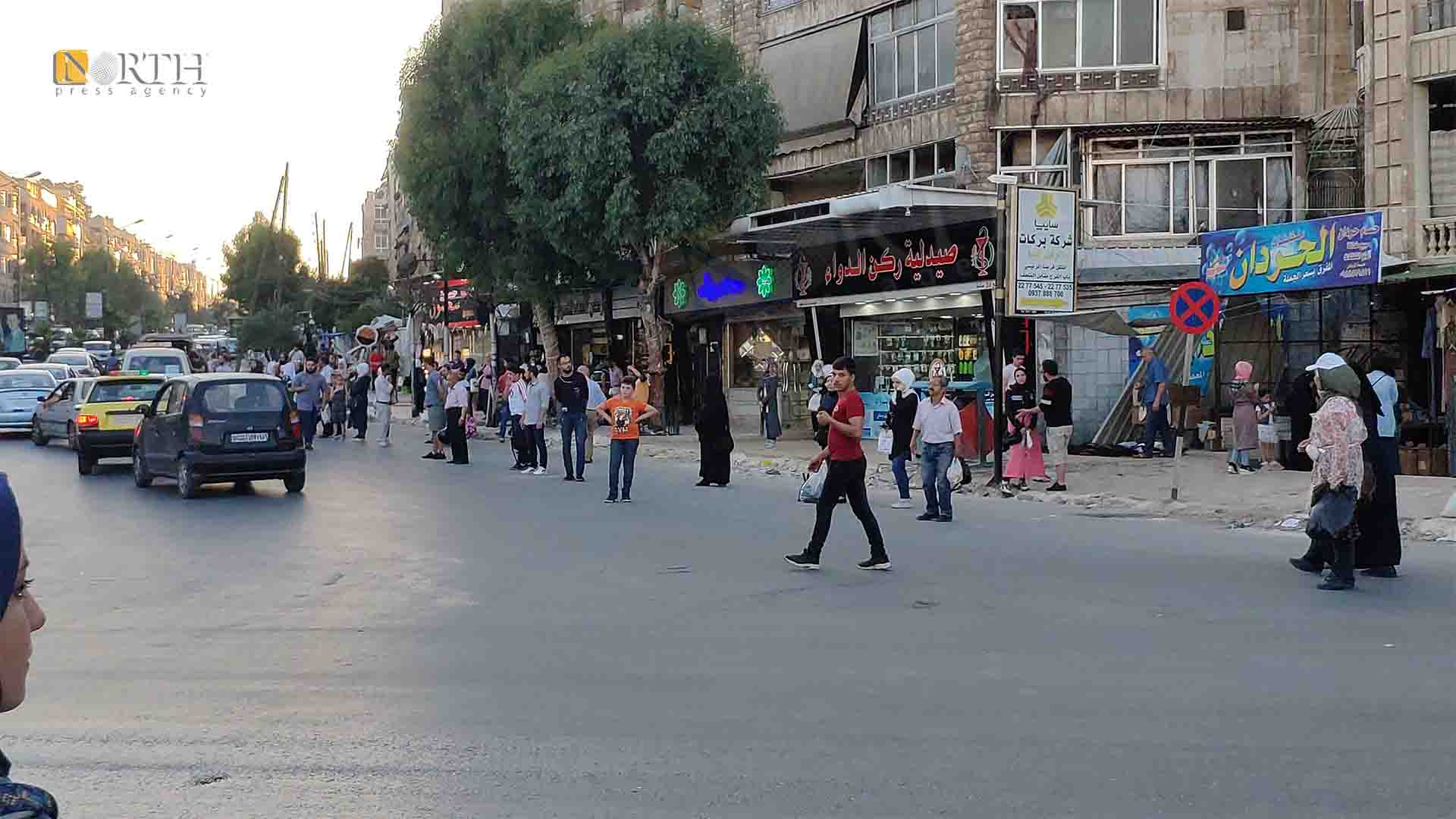ALEPPO, Syria (North Press) – On his way back on feet to his humble house in Salaheddin neighborhood in the city of Aleppo, northern Syria, Abdulrahman al-Hussein passes by dozens of fancy restaurants in the al-Mogambo and al-Furqan neighborhoods finding them full in the evening.
He said, he can only watch them while he is heading to his house after a hard day’s work.
The “luxury” scene is not limited to the evening period for al-Hussein, who is a government employee forced to work extra hours in a pastries shop in al-Mohafaza neighborhood, as he sees families of his customers in the morning different from him and the neighborhood he lives in.
Al-Hussein added, he cannot stop comparing his living condition to others’, wondering how they can bear the costs of this restaurant while his monthly salary of two jobs that last for 15 hours a day, does not exceed 120,000 Syrian pounds (SYP).
The bill of any food or drink in any café or restaurant like this amounts to at least 25,000 SYP.
“That is half of my government salary which has not exceeded 50,000 SYP yet after a 12-year-service.
War made some rich
In the pastries shop, al-Hussein sells large quantities of fancy pastries that one kilogram is sold for more than 50,000 SYP, while the cake is sold for 60,000 SYP.
In return, he sees others “suffer to obtain a living, as they stand in lines to secure bread, a gas propane cylinder, gasoline and fuel. I feel pain and bitter.”
Before the war, al-Hussein’s father used to have a pastries shop in Salaheddin neighborhood, “my government salary and my work with my father in the shop used to cover my families’ needs, but the shop was destroyed and we lost our source of income.”
Aleppo was known as the economic capital of Syria, but it was affected by the fighting, the bombardment, the transfer of a number of its factories to Turkey. In addition, most of its markets were destroyed, burnt and looted which stopped the economic activity.
“Now, the war has made some citizens, officials and traders rich from both the government and the opposition, while it made the majority live under poverty line,” al-Hussein believed.
Varying purchasing power
There are clothing shops in Aleppo that sell best brands at prices that the citizens of limited incomes cannot afford, as the price of one piece amounts to more than 100,000 SYP.
Nuwar al-Sayigh, who works in a clothing shop in al-Mogambo, said that they sell well-known brands brought from Damascus and Lebanon with a customs declaration.
These clothes are sold at high prices as they are imported and well-known brands, and are most of the time brought in response to the demands of rich clients.
Al-Sayigh agrees that those of limited incomes would not take risk and enter such shops even for the sake of asking about the price.
The clothing model applies to other materials and goods such as food, furniture, and basic families’ necessities, according to al-Sayigh.
Rich versus destitute
Although the economically famous Aleppo is known for the diversity of its markets, of which the popular, the traditional and the modern, the war has produced new classes; the destitute majority and the wealthy who benefited from the crises.
Muhammad la-Nahhas, Professor of Economics at the University of Aleppo, said that the middle class, which was a majority before the crisis, was the guarantor of community cohesion.
He believes that the economy is the priority of any government intended to build a cohesive society free from crimes and class strife.
“A big social crack is widening between a poor majority and a rich minority as 80% of the middle class has turned to poor class,” he added.
The middle class has collapsed as a result of the war and the bad living conditions, “in addition to the government’s failure to find successful economic solutions to save the middle class.”
The middle class used to represent the government employees, owners of small shops and industrial workshops in addition to small and medium dealers.
However, all of them tasted the bitterness of war and their economic conditions collapsed whether because of the low government salaries, the loss of jobs, the stop of workshops or other problems.
Al-Nahhas considered this social stratification constitutes a big risk and threatens the social peace in Aleppo.
This is happening in coincide with prohibitively high prices and the formation of what is called “society of queues”, in which the citizens have to wait for long hours to receive basic materials like bread and fuel.
Families in Aleppo and other Syrian cities depend on remittances sent by their relatives from abroad.
However, the remittances “may not be enough to sustain most of the families;” as they are temporary solutions to solve chronic economic problems, but “still succeeded the government solutions.”

